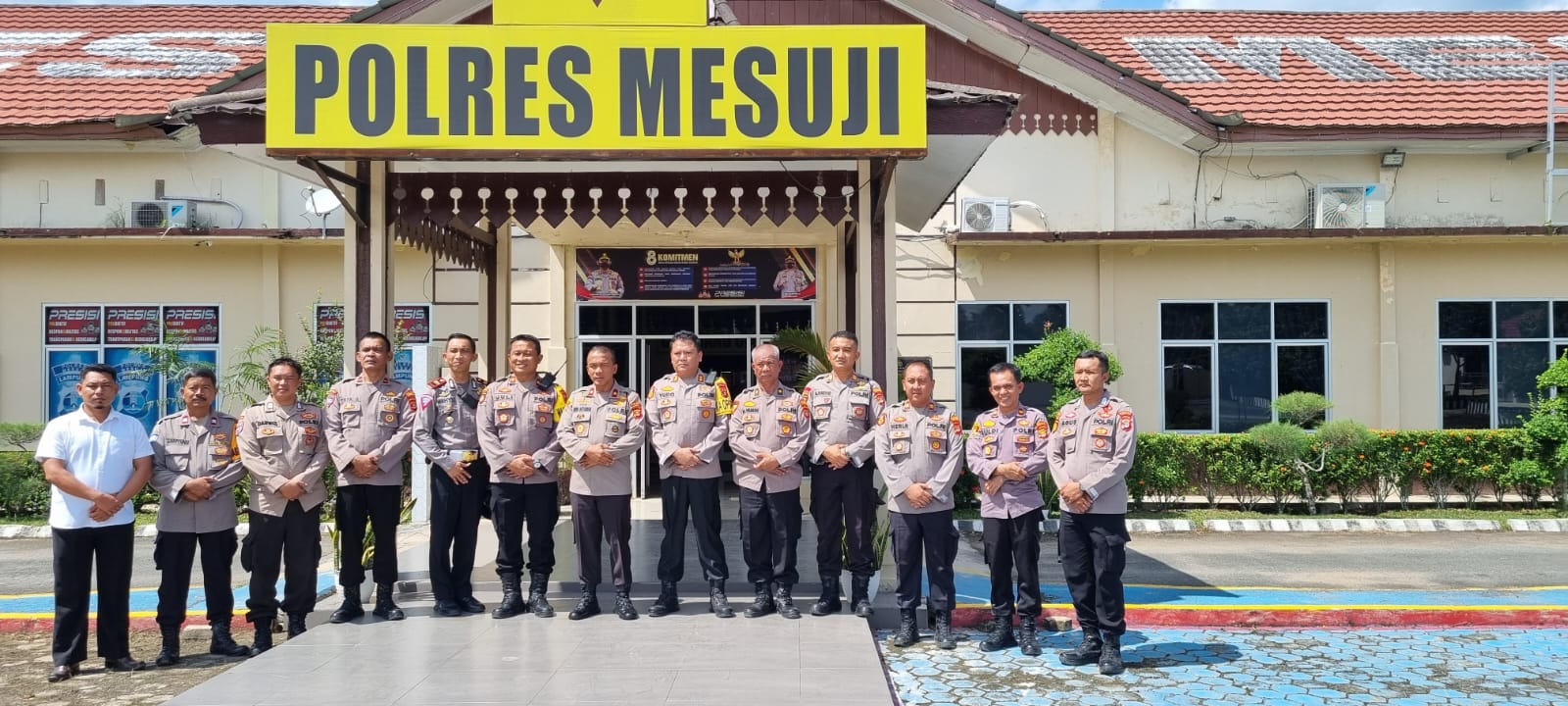Abstract
This research examines the experiences of police working in conflict areas, how they adapt to situations that are prone to conflict, including their views on the conflicting parties, namely the community, companies and local governments as well as the communication barriers they experience with the new culture. This research focuses on the stories of the duties of Bintara, namely the police with the lowest rank in the police structure in conflict areas in Mesuji Regency, Lampung Province, Indonesia. The stories of Bintara who served in this conflict area are very interesting to study and analyze after conducting long research on their lives. This study uses an ethnography approach with qualitative methods, where in-depth interviews and observation are data collection techniques. The results of this study indicate that there is no non-commissioned officer who wants to be placed in a tense area because of the conflict, threats to life that always loom, skin diseases, no clean water source, poisoned food, and communication barriers with the community are one cause, namely stereotypes and prejudices against conflict area communities. The stories of the police on duty as a result of this research are full of tension and life threats are explored in ethnography.
References
Becker, F. G., Cleary, M., Team, R. M., Holtermann, H., The, D., Agenda, N., (2015). No Title. Syria Studies, 7(1), 37–72. Retrieved from https://www.researchgate.net/publication/269107473_What_is_governance/link/548173090cf22525dcb61443/download%0Ahttp://www.econ.upf.edu/~reynal/Civil wars_12December2010.pdf%0Ahttps://think-asia.org/handle/11540/8282%0Ahttps://www.jstor.org/stable/41857625
Beletsky, L., Thomas, R., Shumskaya, N., Artamonova, I., & Smelyanskaya, M. (2013). Police education as a component of national HIV response: Lessons from Kyrgyzstan. Drug and Alcohol Dependence, 132(SUPPL1), S48–S52. https://doi.org/10.1016/J.DRUGALCDEP.2013.06.027
BeritaSatu. (2012, Januari 02). TGPF Ungkap Lima Tersangka Bentrokan Mesuji. Retrieved from BeritaSatu: https://www.beritasatu.com/beritasatu/nasional/24153/tgpf-ungkap-lima-tersangka-bentrokan-mesuji
Blumer, H. (1969). Symbolic interactionism: Perspective and methods. Englewood Cliffs, NJ: Prentice Hall.
Budianto, A. (2020). Ketegangan Sosial di Lampung Akibat Program Transmigrasi Di Era 1950an. Jurnal CANDI, 20(1), 18–31. Retrieved from https://jurnal.uns.ac.id/candi/article/view/41327
Charon, Joel M. (1979). Symbolic Interactionism: An Introduction, an Interpretation, an Integration, Volume 302. United States of America : Prentice Hall Inc.
Coleman, T., & Cotton, D. (2014). TEMPO: A contemporary model for police education and training about mental illness. International Journal of Law and Psychiatry, 37(4), 325–333. https://doi.org/10.1016/J.IJLP.2014.02.002
Dekker, Rianne, Puck van den Brink, and Albert Meijer. 2020. “Social Media Adoption in the Police: Barriers and Strategies.” Government Information Quarterly 37(2):101441.
Dirksen, Vanessa, Martin Neumann, and Ulf Lotzmann. 2022. “From Agent to Action: The Use of Ethnographic Social Simulation for Crime Research.” Futures 142:102994.
Franks, David D. (2007). Mind dalam George Ritzer.The Blackwell Encyclopedia of Sociology. Oxford: Blackwell: 3055-3057.
Herbst, Leigh and Samuel Walker. 2001. “Language Barriers in the Delivery of Police Services: A Study of Police and Hispanic Interactions in a Midwestern City.” Journal of Criminal Justice 29(4):329–40.
Horswell, J. (1995). Education and training of police in the forensic sciences: an Australian perspective. Science & Justice, 35(1), 15–18. https://doi.org/10.1016/S1355-0306(95)72623-5
Ibrahim, A. (2020). Police professional doctrine in Sudan: Establishment and development. International Journal of Law, Crime and Justice, 63, 100414. https://doi.org/10.1016/J.IJLCJ.2020.100414
Inzunza, M. (2022). The significance of victim ideality in interactions between crime victims and police officers. International Journal of Law, Crime and Justice, 68, 100522. https://doi.org/10.1016/J.IJLCJ.2021.100522
Jasin, M. 2010. Memoar Jasin Sang Polisi Pejuang: Meluruskan Sejarah Kelahiran Polisi Indonesia. Jakarta: PT. Gramedia Pustaka Utama. 309 page.
Nurdin, B. V., Damayanti, D., Wiryawan, B., & Cahyadi, R. (2012). Etnografi Marga Mesuji. Retrieved from https://issuu.com/aprohansaputra/docs/buku_mesuji_ok/36
Mead, George Herbert.(1959).The Philosophy of Present.LaSalle: Open Court.
Mead, George Herbert.(1962). Mind, Self and Society: From The Standpoint of a Social Behaviorist. Chicago: University of Chicago Press.
Mesaz, F. (2019, September 22). Pangeran Mad. Retrieved from Buletinterkini: https://www.buletinterkini.com/2019/09/22/pangeran-mad/
Pang, M. S., & Pavlou, P. A. (2019). On information technology and the safety of police officers. Decision Support Systems, 127, 113143. https://doi.org/10.1016/J.DSS.2019.113143
Prihatin, R. B. (2013). Revitalisasi Program Transmigrasi. Aspirasi: Jurnal Masalah-Masalah Sosial, 4(1), 57–64. Retrieved from https://jurnal.dpr.go.id/index.php/aspirasi/article/view/487
Pelangi, I. (2017). Peran dan Upaya Kepolisian dalam Menyelesaian Konflik Antar Warga (Studi Kerusuhan Antar Kampung di Kabupaten Lampung Timur). Jurnal Ilmu Kepolisian, 11(1), 9.
Rahardjo, Satjipto (2002) Polisi sipil dalam perubahan sosial di Indonesia Hasyim Asy`ari, editor (Kompas, 2002)
Roeschley, Ana. 2023. “‘They Care Enough to Document People’s Stories’: Using Ethnographic Methods to Understand Collection Day Outreach Events in Participatory Archives.” Library & Information Science Research 45(2):101234.
Schwalbe, Michael L. (2005).”Self dan Self-Concept” dalam George Ritzer.The Blackwell Encyclopedia of Sociology. California: Sage: 684-487.
Siregar, Sarah Nuraini (2017) Polisi Sipil (Civillian Police) Dalam Reformasi Polri: Upaya & Dilema Antara Penegakan Ham Dan Fungsi Kepolisian . Jurnal Penelitian Politik Vol. 14 No. 2, Desember 2017, Hal. 149-164
Sarnita, I Made (2014) Potensi Konflik di Daerah Tujuan Transmigrasi (kasus sampit dan Mesuji). Media Komunikasi Geografi Vol. 15 Nomor 1 Juni 2014.
Saxton, Michael D., Peter G. Jaffe, Myrna Dawson, Laura Olszowy, and Anna Lee Straatman. 2020. “Barriers to Police Addressing Risk to Children Exposed to Domestic Violence.” Child Abuse & Neglect 106:104554.
Sejarah Kabupaten Mesuji Lampung Sejak Mulai Terbentuk. (n.d.). Retrieved August 15, 2022, from https://www.sekitarlampung.com/sejarah-kabupaten-mesuji-lampung/
Urbanik, M. M., Maier, K., & Greene, C. (2022). A qualitative comparison of how people who use drugs’ perceptions and experiences of policing affect supervised consumption services access in two cities. International Journal of Drug Policy, 104, 103671. https://doi.org/10.1016/J.DRUGPO.2022.103671
Vail, D.Angus. (2007).Preparatory Stage dalam George Ritzer.The Blackwell Encyclopedia of Sociology. California: Sage: 3617.
Veeger. KJ . (1993). Realitas Sosial, Refleksi Filsafat Sosial atas Hubungan Individu – Masyarakat dalam Cakrawala Sejarah Sosiologi. Jakarta: Gramedia. Hlm 224 – 226
Ward, J. A., McGinty, E. E., Hudson, T., Stone, E. M., Barry, C. L., Webster, D. W., & Crifasi, C. K. (2022). Reimagining public safety: Public opinion on police reform and gun violence prevention by race and gun ownership in the United States. Preventive Medicine, 107180. https://doi.org/10.1016/J.YPMED.2022.107180
Zare, H., Meyerson, N. S., Delgado, P., Crifasi, C., Spencer, M., Gaskin, D., & Thorpe, R. J. (2022). How place and race drive the numbers of fatal police shootings in the US: 2015–2020. Preventive Medicine, 161, 107132. https://doi.org/10.1016/J.YPMED.2022.107132

This work is licensed under a Creative Commons Attribution-NonCommercial 4.0 International License.
Copyright (c) 2023 ETNOSIA : Jurnal Etnografi Indonesia





